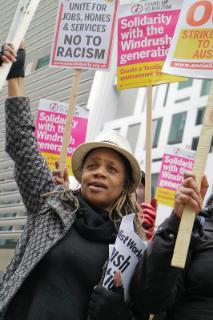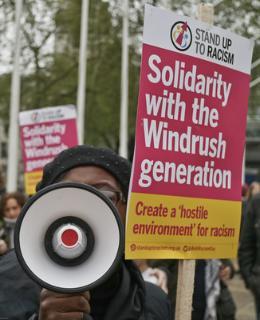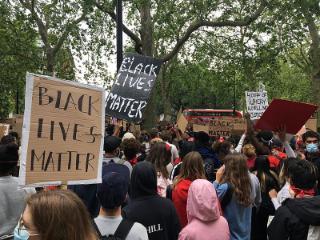Windrush Day 2020
A turning point for Britain’s cultural institutions?
Established in 2018 to commemorate the 70th anniversary of the arrival of MV Empire Windrush at the Port of Tilbury on 22 June 1948, it is likely that Windrush Day 2020 will be viewed as a particularly salient moment in British race relations. What role can cultural institutions like museums and archives play in using this moment to challenge the deep ambivalence about race and belonging in Britain?
2018 was also the year in which news of what became known as the ‘Windrush Scandal’ broke, as the British press (led by The Guardian journalist Amelia Gentleman) began to recount the stories of UK-based individuals from Commonwealth countries who, unable to provide the Home Office with requested documentation of their right to reside in the UK, were facing the loss of employment, welfare support, housing, medical care and, in some cases, forced deportation.


Windrush Scandal Protest - from Parliament Square to the Home Office, London.
28th April 2018. © Steve Eason
Long lobbied for by campaigner Patrick Vernon and the Windrush Foundation, that it wasn’t until 2018 that Windrush Day was formally established might suggest that it was motivated, at least in part, by a government public relations exercise aimed at improving relations with a community who had experienced the sharp edge of Britain’s ‘hostile environment’ policies. In late 2018 £500,000 of government funding was released to enable local authorities, charities and community groups to “celebrate the contribution of the Windrush Generation on Windrush Day and throughout the year”. The rhetoric used to promote the day itself and the new funding scheme chimed with that used by those who protested the Home Office’s treatment of members of the Windrush Generation. Where the Home Office had displayed doubt and ambivalence about the right of these black individuals to live and work in the UK; politicians, press and public responded immediately and forcefully to assert these rights and to emphasise the contribution that members of the Windrush generation had made to British life. MP Diane Abbott’s comments, made in a House of Commons debate that such individuals “came here after the second world war to help rebuild this country, and they worked hard and paid their taxes. There are few more patriotic groups of British citizens than the generation from the West Indies that we are talking about,” were typical. Where immigration policies had sought to undermine claims of belonging, the public response was to position members of the Windrush generation as archetypes of Britishness. The irony of this shift was not lost on those affected. As Amelia Gentleman argues in The Windrush Betrayal: Exposing the Hostile Environment, “A group of people who for decades had faced racism and myriad obstacles to advancement were amazed to suddenly find themselves transformed overnight … into national treasures, embraced by the media’s right wing, respected and beloved” (2019, 285).
A similar nostalgic, patriotic impulse could be perceived in the ways in the Windrush Day funding scheme was framed. Guidance for applicants emphasised that the scheme intended to reflect the Windrush Generation’s “contribution to our nation’s cultural, social and economic life”, noting that “The Windrush Generation and their descendants have contributed a great deal to society over more than seven decades. It is only right that the Government partners with communities to celebrate the arrival of this generation and recognise their contribution”. While the guidance also observed that “Studies have shown that people from Caribbean backgrounds are among the groups most at risk of marginalisation”, this could be overcome, it suggested, by “championing a sense of belonging among people of Caribbean background as well as encouraging people from many backgrounds to embrace our shared history”.
Notions of celebration, of ‘acknowledging the contribution’ made by the Windrush Generation and of recounting a ‘shared history’ were echoed in the selection of initiatives which received funding, many of which emphasised celebration or reminiscence (or both) at the expense of engaging with a contested present. Similarly, museums which generated displays as part of their efforts to mark the anniversary tended to look back, either to the time of the arrival of MV Empire Windrush (for example, through New Arrivals - Remembering the Windrush Generation of the 1950s and 60s at Bruce Castle Museum, Haringey, and through the recreation of a 1960s Caribbean Living Room at the Museum of Oxford) or even earlier, to consider the legacies of transatlantic slavery, as provided the starting point for the art installation A Nice Cup of Tea? at the Ashmolean Museum, Oxford. The exhibition generated by London’s Black Cultural Archives - Windrush: Moving Back, Looking Forward - was distinctive in drawing a line between this ‘shared history’ and divisive experiences of racism and discrimination in the present.

Black Lives Matter peaceful protest on 3rd June 2020; end of march from
Hyde Park to Trafalgar Square. © Katie Crampton (WMUK)
In 2020 it is no longer possible to sustain this separation. The damning findings of the commissioned report into the scandal – Windrush Lessons Learned Review – which risked being eclipsed by the Covid pandemic when published in March 2020, have forcefully re-entered public debate, pushed by the momentum of the #BlackLivesMatter campaign and by the decision of The Equality and Human Rights Commission to pursue a legal ruling on whether the Home Office breached the public sector equality duty when it introduced the ‘hostile environment’ immigration measures. On 22 June 2020 cultural organisations must resist the temptation to promulgate nostalgic evocations of a distant past; to seek to celebrate the contribution made by the Windrush Generation or to commemorate our shared history without also committing to action to highlight and dismantle the institutional racism inherent in the present. London’s Black Cultural Archives have set the pace for an activist practice within the sector, by organising legal surgeries and public meetings for those affected by the scandal. To what extent will other institutions follow?
.jpg)
Dawn Hill, Chair of Black Cultural Archives (standing next to Arike Oke, BCA's Managing Director)
speaks at a public meeting organised by BCA for those affected by the Windrush Scandal,
Lambeth Town Hall, 18 January 2020.
© Helen Mears












